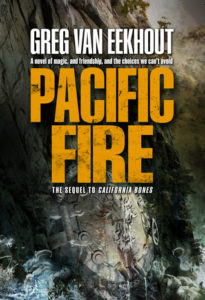Pacific Fire follows its predecessor, California Bones, as an adventure caper set in a darkly magical California that is both contemporary and off kilter. Transport within Los Angeles, for example, is all on boats in canals, the city a gargantuan Venice, and the head of the Department of Water and Power is a feared water mage.
The end of California Bones saw the political order of southern California upended. By the start of Pacific Fire, ten years later, a rough replacement has emerged, but one with enough internal strife that the overall position of the magic kingdom is weakening. Three of the major mages in Los Angeles agree to bury their differences and set themselves up as a ruling triumvirate by creating and, they hope, controlling a Pacific firedrake, a magical creature strong enough to both cow their internal rivals and deter outside powers including northern California and the United States.
Daniel Blackland, the protagonist of the first book, finds out about the plans because one of the would-be triumvirs does not actually want the plan to succeed but cannot openly show his hand for fear of deepening the chaos within the city. Daniel has spent the decade between books on the run from other magicians who want to kill him and eat him — in this world magical power resides in the bones and flesh of magical creatures, most definitely including wizards, and someone who consumes them gains their powers. He has also been raising Sam, a golem created from part of southern California’s former Hierarch and thus possessed of much of the Hierarch’s magic. It’s an open question which of the two would be a more nutritious meal for any rival fortunate enough to kill them both. Their tastiness as targets and Daniel’s own disposition keep the two of them on the run, at least until word of the firedrake comes to Daniel.
He believes that the firedrake will become a weapon of mass destruction in the hands of people he knows to be ruthless criminals, and resolves to put together a team to stop its creation. Before he has taken more than the first steps toward that goal, however, an attack gets past his defenses and puts him out of commission. Sam draws on his own magical abilities to save Daniel’s life, but he is in no condition to finish the mission. Sam resolves to take on the task himself, and the caper is back on, from the point of view of a new and less-experienced protagonist.
California Bones was dark in places — with magic based on eating other magicians, that was unavoidable — but there was also a certain glee in presenting the skewed world (hints about Disney, positing William Mulholland as a magician) and relative innocence in the heist story. In Pacific Fire, the setting is established, so I found less joy of discovery in this book. By shifting the perspective to Sam, van Eekhout adds a bit of a coming-of-age narrative, elides the problem of Daniel being more powerful than almost anyone else in California, and lets readers see some of the darker sides of Daniel that he does not necessarily realize about himself. Those aspects all deepen the series as a whole, but I missed the fun and inventiveness of the first book.
Pacific Fire is still a brisk caper, a tightly-wound adventure full of obstacles and reversals. Indeed, by shifting emphasis to Sam while keeping Daniel still in the mix, van Eekhout has given himself room for seriously changing one or both of his protagonists without prematurely ending the trilogy in its second book. The novel also gets stronger when Daniel recovers enough to set off in Sam’s wake to add his own abilities to the efforts to stop the creation of the firedrake. Fittingly, the book’s closing scenes are its best. Readers learn that some things were not as they seemed, while other truths were hiding in plain sight. It’s a fine ending for Pacific Fire and a good setup for the third book, Dragon Coast.

